American Sign Language (ASL) Exchange
Emmanuel (Mani) García, Psychology
Faculty Advisor: Dr. Regina Miranda
NML Awards: The New Media Lab Digital Dissertation Award (April 2017), The History and Public Health Award (January 2016)
BOUT Mani Garcia (lead researcher) AND his RESEARCH
Below is a video in ASL (with closed captioning) where I introduce myself and my research. A transcript of the video is provided below the video.
Hi I’m Mani Garcia. My sign-name is the letter-M brushing down on my right eyebrow. I’m a 4th year PhD student at the City University of New York (CUNY) Hunter College. I work in the Experimental Psychopathology Lab directed by Dr. Regina Miranda. My research is focused on finding ways to improve and promote the physical and mental health of Deaf community members by developing better assessment and treatment. I am focused on problems related to anxiety, depression, and stress. There is evidence that the Deaf community is impacted more negatively by the effects of anxiety, depression, and stress than hearing people (Fellinger, Holzinger, & Pollard, 2012) are. In addition, the small number of physical/mental health providers culturally and linguistically competent to serve the Deaf community leaves Deaf people with very few suitable options in a time of need (Cabral, Muhr, & Savegeau, 2013). This lack of suitable options has been tied to harmful cognitive, emotional, and social consequences for Deaf people. My research is focused on understanding potential solutions to the problems discussed in this video.
ABOUT ASL EXCHANGE
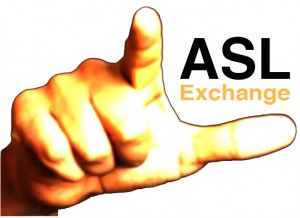 American Sign Language (ASL) Exchange was founded as online platform to engage in clinical research/practice on Deaf mental health in collaboration with the Deaf Community—an approach considered best practice. Due to a dearth of health professionals and researchers who are fluent in ASL—and the cultural/linguistic minority status of the Deaf Community—physical/mental health literacy, capital, and best-practice is severely limited in the ASL Community. To address these gaps the ASL Exchange is focused on engaging in best-practice clinical education, research, and cultural/linguistic adaptation efforts in collaboration with the ASL Community.
American Sign Language (ASL) Exchange was founded as online platform to engage in clinical research/practice on Deaf mental health in collaboration with the Deaf Community—an approach considered best practice. Due to a dearth of health professionals and researchers who are fluent in ASL—and the cultural/linguistic minority status of the Deaf Community—physical/mental health literacy, capital, and best-practice is severely limited in the ASL Community. To address these gaps the ASL Exchange is focused on engaging in best-practice clinical education, research, and cultural/linguistic adaptation efforts in collaboration with the ASL Community.
Mission Statement
The mission of the ASL Exchange is to help facilitate a sea change of increased access to physical/mental health education, assessment, and interventions for Deaf and deaf-blind individuals.
Guiding Values:
- Do not assume value: create value.
- Do not greet crisis with business as usual.
- Flexibility gives creativity a life span.
- Communication is paramount: work at it constantly.
- Match attention with intention: this creates sustainable results.
ASL Exchange News
- On September 16th, 2017, ASL Exchange is co-hosting a Symposium with Lexington Center for Mental health Services entitled, “Language and Deaf Mental Health: Interpreting in Context.” Below is a ‘save the date’ announcement with abstract video in ASL, with the English transcript and flier posted below the video. More information soon.
Video abstract: Deaf Studies research provides converging evidence that deaf people living in a hearing dominated world face lifelong language-related experiences and barriers that relate importantly to their mental health and well-being. Though deaf people are different in many ways, shared language experiences, and challenges to mental health and well-being linked with those experiences, are an important and interesting context that hearing and deaf interpreters work within. One September 16, 2017, Lexington Mental Health Center and ASL Exchange are hosting a one-day symposium where deaf and hearing researchers, interpreters, psychologists, and community members will lead a discussion focused on exploring this topic more. The symposium in entitled: “Language and Deaf Mental Health: Interpreting in Context.” The symposium will include research presentations, a panel of deaf community members, and deaf-led breakout workgroups, focused on applying discussion points and determining community action items.
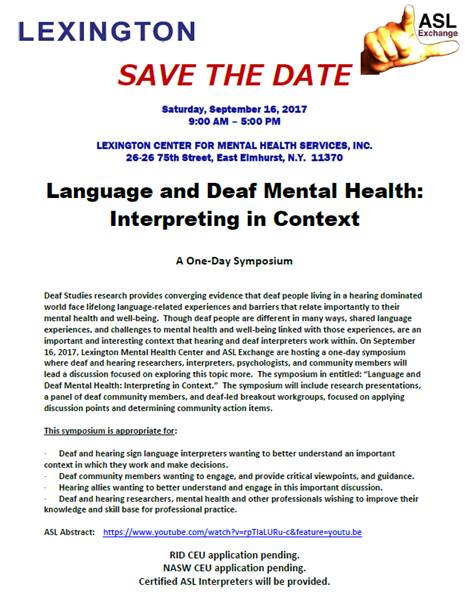
- The first round of footage for the Digital Dissertation Award by the CUNY New Media Lab funded project,”Evaluation of a ‘Deaf Friendly’ Digital Tool for Guided Meditation and Non-Verbal Self-Assessment of Emotions on Mobile Devices.”—in collaboration with deaf Zen Buddhist monk and mental health researcher/clinician Ōshin Jennings of No Barriers Zen—has been shot and looks fantastic. More updates soon.
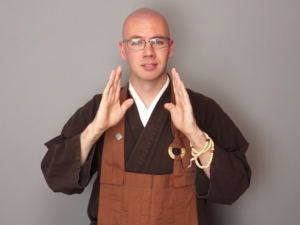
- Mani presented a poster entitled “Deaf Friendly” Emotion Assessment with the Self-Assessment Manikin: Case Report at the CUNY-GC Eighth Annual All-Psychology Research Day. 5-5-17

- Mani received the Digital Dissertation Award by the CUNY New Media Lab for a new project,”Evaluation of a ‘Deaf Friendly’ Digital Tool for Guided Meditation and Non-Verbal Self-Assessment of Emotions on Mobile Devices.” in collaboration with deaf Zen Buddhist monk and mental health researcher/clinician Ōshin Jennings. 4-26-17
- During a new collaborative effort with neuroscientists in Puerto Rico, #TransAtlanticNeuroscience, I recorded a livestream demonstration of my “backpack elecrophysiology lab” project in ASL with my friend and colleauge Juan Víctor Concepción Cardona of Rubric Solution. There are 6 sections to the demo. Click on the images below to see. Note: American Sign Language (ASL) without voiceover or captioning. An HD video of the demo was also recorded and will be released with captioning and a transcript as soon as possible.
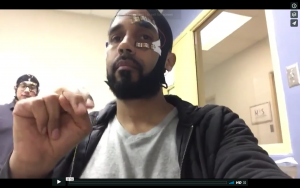
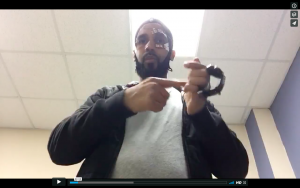
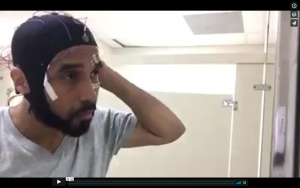
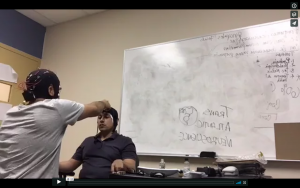
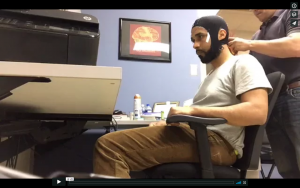
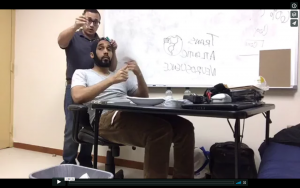
- I recently attended the AAAS – The American Association for the Advancement of Science meeting. At the meeting we had a chance to talk about our science with very little rehearsal. It can be hard to do when you are nervous. They provided the camera crew, some coaching, and the final edited video here. This was not easy but fun, and good practice in communicating science. This video is about my dissertation research on the relationship between communication barriers experienced by culturally Deaf people and mental health outcomes. Thanks to #AAAS. Note: This video is in American Sign Language (ASL) without voiceover or captioning. A transcript of the video is provided below the video. 3-1-17
Video transcript: “Hi, I’m Mani García-Lesy. My sign-name is the letter-M brushing down on my right eyebrow. I am a Doctoral Researcher at the City University of New York (CUNY)-Graduate Center. I conduct research in Psychology and work as a clinician (or therapist). I have also worked as a sign language interpreter for 26 years. Currently, I am completing my PhD research. My research is focused on communication difficulties. Deaf people are all too familiar with experiencing many forms communication difficulties (e.g. in interactions with hearing people; when captioning is not provided for a TV program, etc.) and a lack of access to communication—experiences that contribute to distress. I am interested in understanding the cumulative effects of communication difficulties on emotional distress, and how these relate to mental health outcomes for Deaf people. My research will involve conducting interviews focused on understanding Deaf people’s communication experiences, to help us understand these research questions better. As part of my research I also founded ASL Exchange, a web-based platform where I post vlogs, interviews with Deaf scientists, researchers, and psychologists, along with culturally affirmative resources in presented sign language. My goal is to contribute to the enhancement of our education as a community of Deaf people, interpreters, and hearing allies—promoting better mental health awareness and practice.”
- We are excited to release a live stream video of Dr. Amber Martin’s talk at the Center for Anxiety (Brooklyn office). Dr. Martin participated in the Center for Anxiety Free Community Lecture Series on September 28, 2016 at 12:30, at The Center for Anxiety (Brooklyn), 3692 Bedford Ave P2, Brooklyn, NY 11229.
This is the latest development in latest development an ongoing collaboration between ASL Exchange and the Center for Anxiety. NOTE: Captions and a transcript are being prepared for a video recorded version of the talk that will include captioning, a transcript and voice over. While that is being prepared we are releasing this unedited live stream, mimicking the live event. The lecture is in American Sign Language and voice interpreted into English.
Lecture slides can be obtained at this link: tinyurl.com/hax9qwt Lecture references can be obtained at this link: tinyurl.com/hjmuoxb
ABSTRACT Early language experience is important for both setting children up on the path to fully acquire a language, and for ensuring access to information from others around them. However, many deaf children lack access to a language they can easily acquire. This lack of access is due to widespread misinformation about what language is, how it is acquired, and what we use it for. In this talk I will discuss the impacts of early language exposure on deaf children in both cognitive and social domains. I will also suggest ways that we can improve early language experiences to improve wellbeing in deaf children, adolescents and adults.
BIOGRAPHICAL INFORMATION Amber Martin, Ph.D. is a faculty member in the Hunter College Psychology Department—City University of New York— where she teaches courses in Child Development, Cognitive Processes, and Emotion (CLAS Lab- Dr. Amber Martin Hunter College). She received her B.S. and Ph.D. from the University of Minnesota’s Institute of Child Development. She completed her post-doctoral studies at Barnard College where began her current work studying deaf children in Nicaragua. Her research focuses on the relations between developing language and cognition, and the impact of early language deprivation and delayed acquisition in deaf children. 9-29-17
- Dr. Amber Martin, academic advisor to ASL Exchange recently gave a lecture in ASL, “The Cognitive and Social
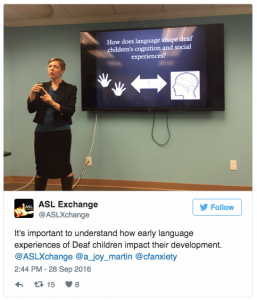 Impacts of Early Language Experiences of Deaf Children” at the Center for Anxiety in Brooklyn. This was the first ASL Exchange event, as part of a continuing collaboration with the Center for Anxiety to provide free accessible mental health education to the Deaf community. To the right is a screenshot of a tweet we sent out from the event. 9-28-16
Impacts of Early Language Experiences of Deaf Children” at the Center for Anxiety in Brooklyn. This was the first ASL Exchange event, as part of a continuing collaboration with the Center for Anxiety to provide free accessible mental health education to the Deaf community. To the right is a screenshot of a tweet we sent out from the event. 9-28-16
- Mani recently contributed tweets to an online campaign meant to raise awareness about the accessibility challenges Deaf people face, that hearing people often take for granted, using the hashtag #hearingprivilege. Some of Mani’s tweets were featured in a Huffington Post article and Buzzfeed article. 9-28-16
- We are very proud to report that our Clinical Research Trainee, Eileen Fair, has graduated Cum Laude from Northeastern University with a Bachelor’s Degree in ASL & Psychology. Eileen is now working as a Paraprofessional at The Children’s Center for Communication-Beverly School for the Deaf and searching for graduate programs in Clinical Psychology. Fortunately, she is still working with us on ASL Exchange projects, and on Mani’s Doctoral Dissertation “iD Study” project, which begins data collection very soon. Congratulations Eileen, we are so happy to have you on our team. 8-14-16
- Read My week at the CUNY Graduate Center Digital Research Institute (#GCDRI) by Mani. 8-12-16
- Mani has made progress with his Portable EEG project. Read more here. 8-9-16
- I (Mani) have just received the Graduate Center “Digital Project Incubation Grant” for my Portable EEG project. 7-20-16
- I (Mani) have just received the University of Alabama at Birmingham Neural Conference Research “Shark Tank” Award for my Portable EEG project. 6-24-16
- I (Mani) have just received the City University of New York Dean K. Harrison Travel-Research Award, for work on the iD Study and ASL Exchange.
- We are thrilled to welcome Eileen Fair, a second semester senior at Northeastern University in Boston, as a new ASL Exchange Clinical Research Trainee. Eileen is completing a bachelors degree in ASL & Psychology. More information and video introduction is coming soon. 2-29-16
- We are thrilled to have Professor Michael Ballard, of Iowa State University, as a new ASL Exchange Academic Partner. We have some exciting plans together. More information and video introduction is coming soon. Read more about Professor Ballard here. 2-26-16
- I (Mani) am thrilled to now have my colleague and co-investigator, Dr. Amber J. Martin of Hunter College, as ASL Exchange Administrator. A video introduction is coming soon. Read more about Dr. Martin here. 2-23-16
- A sneak peek at 2 members of the ASL Exchange interpreting/translation team: Katherine Walley & Erin Quinn. 2-7-16
- I (Mani) just received the History and Public Health Award by the CUNY New Media Lab for my first ASL Exchange research project, in collaboration with Drs. Amber Martin and Regina Miranda at Hunter College. The award is for the iD Study. 1-21-16
- ASL Exchange and The Center for Anxiety (Brooklyn office) present: The FREE ASL interpreted lecture by Dean McKay, PhD, ABPP, “The Limits of Medication for Your Children and You: Excessive Medical Interventions for Mental Disorders.” Interpreter: Mani Garcia, MA, CI. 1-15-16
- I (Mani) was just awarded the CUNY Diversity Project Development Fund (DPDF) grant for my first ASL Exchange research project, in collaboration with Drs. Amber Martin and Regina Miranda at Hunter College. The award is for the iD Study. 12-11-15



